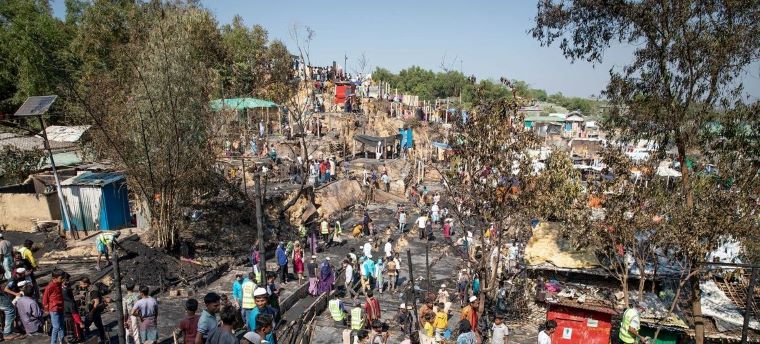This is an archive of news stories and research from the National Union of Public and General Employees. Please see our new site - https://nupge.ca - for the most current information.
The strength of the Rohingya, particularly the women and girls subjected to gender-based violence, to trafficking and child marriages, and to being used as weapons of war continues to be an inspiration to us all. It is vital that the international community recognize and take action to support the Rohingya in their battle against genocide. — Larry Brown, President of NUPGE

Ottawa (15 March 2022) — The genocide of the Rohingya continues. The Rohingya are an ethnic minority in Myanmar, also known as Burma. Rohingya Muslims made up the largest number of Muslims in Myanmar, a predominantly Buddhist country. Although the Rohingya had lived there for generations, the government has denied them citizenship.
Women and girls used as weapons of war
In August 2017, the Myanmar military launched a crackdown, committing mass rape, torture, and murder of the Rohingya, and destroying their villages. Rohingya women and girls have been systematically targeted by these horrific acts of violence. The attacks caused over 700,000 to flee, joining the hundreds of thousands previously driven out by violence. Many live in refugee camps in Bangladesh.
The situation has become widely considered to be ethnic cleansing or genocide. In September 2018, the House of Commons unanimously voted to call the Rohingya killings a genocide. The International Court of Justice and the International Criminal Court are both investigating Myanmar for the atrocities against the Rohingya.
A military coup in February 2021 triggered unrest and continues to put the Rohingya in a vulnerable position. The COVID-19 pandemic and 2 major fires in the refugee camps in Bangladesh have also exacerbated the situation, particularly for women and girls. The safety mandates implemented to prevent the spread of the pandemic have intensified the exposure of women and girls living in the camps to gender-based violence.
Working with Rohingya Women Welfare Society
NUPGE and its Advisory Committee on Women’s Issues have worked closely with the Rohingya Women Welfare Society (RWWS). The RWWS is a grassroots organization that works in the refugee camps in Cox’s Bazar, Bangladesh, to support Rohingya women and girls who have experienced violence, sexual exploitation, trafficking, child marriages, and abuse.
Razia Sultana, director of the RWWS, spoke at NUPGE’s 2019 Triennial Convention about the atrocities that the Rohingya, and most specifically Rohingya women and girls, have faced. A resolution was passed to support the RWWS, and in December 2019, NUPGE’s National Executive Board approved a financial contribution to the RWWS of $20,000 over a 3-year period.
NUPGE’s second contribution helped to provide the RWWS with resources to purchase necessary items like hijabs, bourkas, undergarments, and baby and adult clothes for victims of the 2 tragic fires that have taken place within a year.
Resilience and a path forward
The RWWS continues to work tirelessly to provide support to women and girls in the camps in the Cox’s Bazar in Bangladesh. They partnered with the Nobel Women’s Initiative and the Azadi Project to pilot an innovative storytelling, leadership, and psychosocial support train-the-trainer program. This pilot program resulted in 75 community women and 25 men working to sensitize both women and men in the camps, raising awareness of the need to reduce and eliminate gender-based violence.
“The strength of the Rohingya, particularly the women and girls subjected to gender-based violence, to trafficking and child marriages, and to being used as weapons of war continues to be an inspiration to us all. It is vital that the international community recognize and take action to support the Rohingya in their battle against genocide,” stressed Larry Brown, President of the National Union of Public and General Employees.
